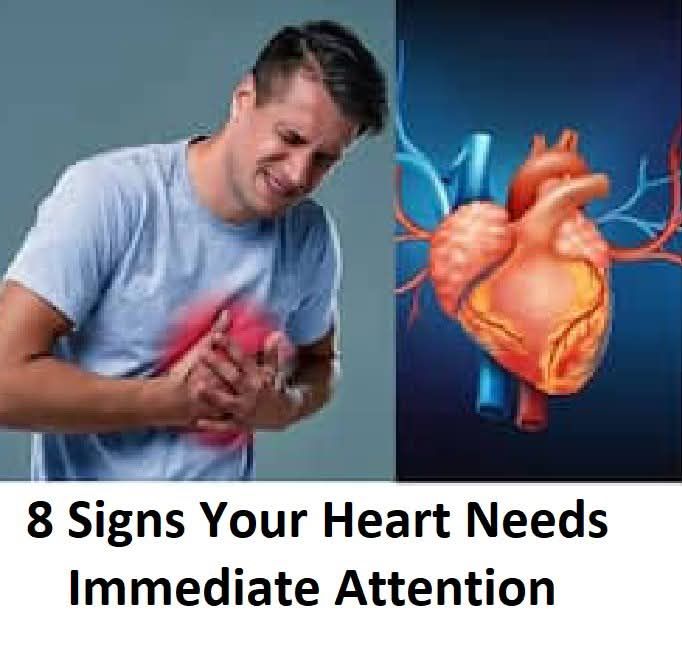
Your heart is one of the most vital organs in your body, and paying attention to any signs or symptoms of potential heart issues is essential for maintaining overall health. Some symptoms may indicate that your heart is in distress and requires immediate medical attention. Here are 10 signs your heart needs immediate attention:
1. Chest Pain or Discomfort
Chest pain or discomfort, often described as a crushing, tight, or heavy sensation, is one of the most common signs of a heart attack. It may radiate to the arms, back, neck, jaw, or stomach. If you experience this, especially if it lasts more than a few minutes, seek immediate medical help.
2. Shortness of Breath
Difficulty breathing or feeling out of breath, even when you’re not exerting yourself, could be a sign of heart failure or an impending heart attack. If this occurs alongside chest pain or dizziness, it’s crucial to call for emergency help.
3. Dizziness or Lightheadedness
Feeling lightheaded, faint, or dizzy, especially when standing up or engaging in mild activity, can be indicative of low blood pressure or a heart arrhythmia. If accompanied by chest pain or palpitations, this is a serious symptom that requires immediate attention.
4. Palpitations or Irregular Heartbeat
If your heart feels like it is pounding, racing, or skipping beats, it could be a sign of an arrhythmia or irregular heartbeat. While not all palpitations are dangerous, if they are persistent, cause discomfort, or are accompanied by chest pain, seek medical help right away.
5. Pain in the Neck, Jaw, or Upper Back
Pain or discomfort that radiates to the neck, jaw, or upper back can sometimes be a symptom of a heart attack. Women, in particular, are more likely to experience heart attack symptoms in these areas rather than traditional chest pain.
6. Sweating or Cold Sweats
Excessive sweating or experiencing cold sweats without exertion, particularly if accompanied by other symptoms like chest pain or nausea, can indicate a heart attack or serious heart issue.
7. Nausea or Vomiting
Feeling nauseous or vomiting, especially in combination with other heart-related symptoms like chest discomfort or shortness of breath, can be a sign of a heart attack, particularly in women. Never dismiss these symptoms, as they can be warning signs.
8. Pain or Discomfort in the Arms or Shoulders
Pain or discomfort in the left arm, shoulder, or upper back can be a sign of heart trouble. This symptom may accompany other issues such as chest pain, shortness of breath, and dizziness.
9. Swelling in the Legs, Feet, or Abdomen
Swelling in the legs, feet, or abdomen could indicate heart failure. When the heart isn’t pumping effectively, fluid can build up in the lower parts of the body, leading to edema. If swelling is sudden and accompanied by difficulty breathing or chest pain, seek immediate medical attention
10. Sudden Fatigue or Weakness
Extreme fatigue or weakness that comes on suddenly and unexpectedly, especially if it’s different from what you normally experience, could be a sign of heart disease. If you feel unusually tired and have difficulty completing even simple tasks, consult a healthcare professional as soon as possible.
What To Do If You Experience These Symptoms:
Call for Emergency Help: If you experience any of these symptoms, especially chest pain, shortness of breath, or dizziness, it’s important to call 911 or your local emergency services immediately.
Stay Calm: While waiting for emergency responders, try to remain calm. If you’re experiencing chest pain, avoid any physical exertion, and try to chew and swallow an aspirin if recommended by your doctor (unless you have an allergy to it).
Avoid Driving Yourself: If you’re having a potential heart emergency, do not drive yourself to the hospital. It’s best to wait for emergency medical professionals who can provide immediate care.
Conclusion:
Your heart is a critical organ, and when you notice any of these warning signs, it’s important to take immediate action. Don’t wait for the symptoms to worsen, as early intervention can save lives. Always trust your body and seek medical attention if you believe something is wrong with your heart. Regular check-ups with your healthcare provider and maintaining a healthy lifestyle can help you prevent many heart-related issues.